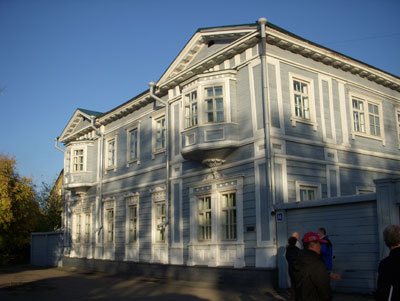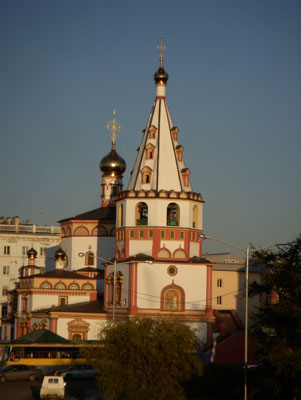Trans-Siberian Railroad
This item appears on page 54 of the October 2010 issue.
by Jay Brunhouse (Third of three parts)
By the clock, Wednesday was 26 hours long. Thursday was 25. Friday was 26 again as we entered the Moscow time zone. Our Zarengold Tran-Siberian private train had become a rolling time machine as we day by day set our watches back through six time zones from Irkutsk to Moscow. It was a wonderful thing. We stayed up late, got up early and still had extra sleep.
Leaving Siberia’s Lake Baikal, the Zarengold had passed through the Circumbaikal Railway’s stone-lined tunnels — some short and some surprisingly long — and I wondered over the handwork and craft of the masons in this remote and harsh location.
Between the golds of the birch and larch and the brilliant reds of the ash trees crowding the mountainsides in the Siberian September, the starkly green firs stood as timeless sentries.
Approaching Irkutsk, our Zarengold ran with the Angora River — the only river flowing out of Lake Baikal — and we saw the profile of the city, formerly rich because of the caravans carrying tea, silk and porcelain from China and returning with black sable and black fox furs for trimming the robes of the mandarins.
Paris of Siberia
lrkutsk, the remote capital city of Siberia with a population of about 600,000, is large enough to have an electric trolley network and congested street traffic, and everyone aboard liked it.
I was particularly interested in Irkutsk because I had read that, in December 1825, following an abortive revolution, Czar Nicholas I had banished to Siberia some 120 cultured, moneyed and titled aristocrats. They became known as the “Dekabristi,” the Decembrists.
Many royal wives followed their husbands into exile. Princess Maria Volkonskaya, wife of the Decembrist leader, brought her clavichord with her on a sledge. Arriving later came her inlaid table, Empire furniture, her library of 3,000 books, her gilt Italian music box and her opera glasses for the opera that she never again attended.
At 4 p.m. we were seated in Maria Volkonskaya’s manor house, now a museum. We enjoyed our first touch of Russian culture as a tenor, soprano and a pianist, who played the 1831 piano named Lichtenthal, interpreted music exclusively from the time of the Decembrists — Chopin to Schubert.
Westward across Siberia!
The morning haze lifted and the sun broke out as we left Irkutsk and began the formidable 3,222-mile crossing to Moscow in five days. Our guide briefed us on Siberia and its colonization and, after lunch, led a vodka and caviar tasting. After the blind tasting, surprisingly, the unanimous tasters’ choice was the American vodka.
After dinner we set our watch two hours back.
On Thursday, Sept. 24, 2009, we reached Novosibirsk (pop. about 1,426,000, the third-largest city in Russia) for a folklore, bread and salt welcome at the largest train station in Siberia.
Following a tour of the charmless city, we had free time to mingle among shoppers in the city center and spend a few rubles of our own. Foreign visitors are rare in the city, so there were few touristy items for sale and we enjoyed an uncorrupted Siberian experience.
We set our watches back one hour after dinner.
At 4:15 p.m. on Friday, Sept. 25, Yekaterinburg appeared like a vision among the nearly endless spruce and firs. The largest city of the region (Russia’s fifth largest, pop. about 1,300,000), Yakaterinburg became known as the “Pittsburg of the Urals” when Russia moved entire factories there from Moscow before the advance of German armies.
We visited the byzantine Blood Church honoring the Romanov family. It was built on the site of Ipatiev House, where Bolsheviks shot Czar Nicholas II and his family and thereby terminated the Romanov dynasty.
Yakaterinburg was everywhere a delight. We enjoyed strolling through the green park beside the city pond and walking pedestrian streets busy with burghers shopping. Golden church domes and sparkling new highrises surrounded us.
At 6:57 p.m., 40 minutes after we left Yekaterinburg, and at the continental divide, we entered a dark tunnel in Asia and emerged into a dark night in Europe.
We set our watches two hours back to match Moscow time.
The fairest city
On Saturday, 543 miles down the line, we arrived in Kazan, “the fairest city in the whole of Russia.” Known as the third capital of Russia (pop. about 1,137,000), Islamic Kazan is prosperous and wallowing in income from oil production… and looking beautiful.
In Kazan, for the first time while crossing Siberia, the mood was different. Here the shopping area was filled with tourists — Russian tourists visiting the capital of Tatarstan.
Our city tour took us to the Kazan Kremlin, the UNESCO World Heritage Site built by Ivan the Terrible. My eyes grew wide as I entered the splendid Kremlin and was surrounded by the bulbous, beautiful, sky-blue domes of the Tatar/Russian Annunciation Cathedral (1554-1562); the graceful towers of the Qolsharif Mosque, rebuilt by Saudi Arabia; the curious, leaning Soyumbike Tower, and the imposing Spasskaya Tower.
After lunch, the breeze was soft as we enjoyed a boat cruise on the mighty Volga River.
During dinner on the train, off we sped to cover 492 miles more to Moscow’s Kazan train station. Before flying home, we enjoyed a walking tour of the Moscow Kremlin, a photo stop at St. Savior’s Cathedral and a nice hotel in the capital city.
Many thanks
I thank Steve Dobbins of Lernidee Tours in Berlin (www.lernidee.de) for inviting me on this incredible journey. Lernidee’s Felix Willeke was always with us to help and to solve problems, but there weren’t any. Events went seamlessly and organization was nearly perfect.
For 2011, my single compartment with toilet and shower is listed at $18,395 for 16 days, Beijing-Moscow, including all meals and sightseeing. For more information, contact Bjarne “BJ” Mikkelsen, Great Dane Journeys (New York, NY; phone 917/282‑2305 or e‑mail bj@greatdanejourneys.com). BJ represents Lernidee Tours in North America.
In Irkutsk we overnighted at the three-star Hotel Irkutsk (phone [007] 3952 250168; website and rates unavailable). While in Moscow we stayed in Hotel Renaissance (phone [007] 495 931 9000, www.marriott.com), with rates from RUB14,900 (about $478).
I booked Star Alliance flights from San Francisco to Beijing and return from Moscow via Beijing — a bargain at $1,100.


